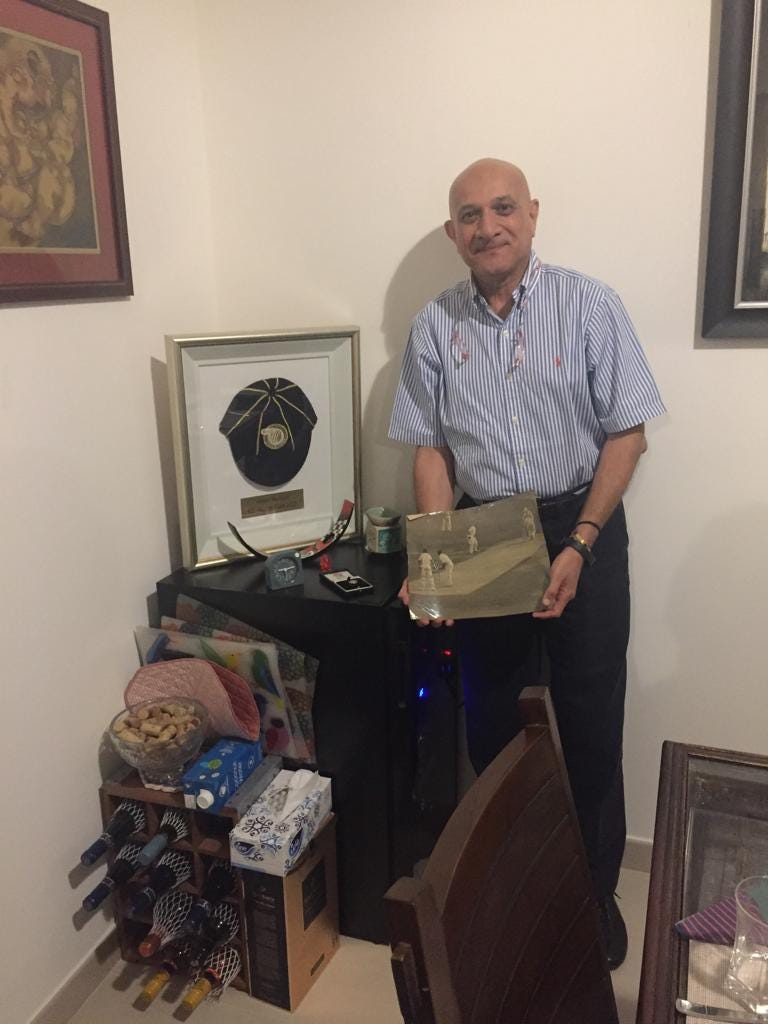“You must call me Jigga, this is what my daughters and grandkids call me”
This was the last message I received from Rahul Mankad, in which he also said he was getting a cardiac consult in London on April 12 and would then “notify of his movements.”
On March 30, Rahul Mankad died.
He will always be known as the last surviving son of Vinoo Mankad, arguably the greatest cricketer India has produced.
But Rahul Mankad was no slouch as a cricketer himself. At a time when it was next to impossible to break into a Bombay team that won the Ranji Trophy as a matter of course, he played 47 first class matches between 1972 and 1985. He averaged 35.77 and had a highest score of 162. He won the Ranji Trophy multiple times.
When I first met Rahul Mankad, his cricketing days were well behind him. But he was a staunch follower of India, especially in Test cricket. We’ve met in Brisbane and London, at cricket, and I assumed he lived in one of these geographies till the recent Twenty20 World Cup in the United Arab Emirates.
In Dubai, he insisted on driving out a considerable distance, in traffic, to come and collect some of us journalists to take back to his home for dinner. This was a courtesy too far, but nothing could persuade him from doing so.
Sprightly as ever, standing next to a typical Dubai SUV, he was ready for us, in the blazing sun.
When we reached his home, Rahul Mankad’s wife was just about ready for us. She had done some cooking prep in the morning — then gone to work for a full day and come back to put on considerable finishing touches — and we were blown away.
This was hospitality beyond the pale. The Rahul Mankad household had gone so far out of the way to provide a spread that it made us feel more like interlopers than guests.
Within minutes, the conversation flowed, and one of the key things that came up was the run out at the non-striker’s end that was still being referred to as Mankaded.
For long, Rahul Mankad has campaigned to ensure that this very legitimate form of dismissal be de-stigmatised, or, at the very least, be untied from his father’s good name.
The cricket faithful will know that the origin of this comes from India’s 1948 tour of Australia when Vinoo Mankad, after repeated warnings, ran out Brown at the non-striker’s end when he was backing up too far.
The mode of dismissal was legal then, it has been further de-stigmatised since, and most recently the International Cricket Council has officially moved to remove any reference to this from the unfair play section in its codes.
Back in 2017, when I first asked Rahul Mankad about this mode of dismissal, he was typically calm, idiosyncratically polite but firm. “It doesn't bug me , but what does is how ill-informed people are. I'm not running away from it, my father never ran away from it. It's just awkward for me to have to explain this to people, who are lovers of the game, simply because they don't have a better sense of the history of the game.”
When pressed further, he was happy to explain. “People like Geoff Boycott have told me that if his son effected such a dismissal, he would be disowned. He obviously didn't have the facts. And he obviously has a selective sense of propriety or ethics or spirit of the game. That is hurtful and uncalled for.”
When we visited Rahul Mankad’s home in Dubai, he was happy to bring out the scrapbooks, which had photos of the great Vinoo Mankad in action, but also one iconic image of him running out Brown.
Equally, there was the framed baggy cap that the ICC presented to Rahul Mankad when his father was inducted into the Hall of Fame.
There was an overwhelming sense of pride, but not a touch of arrogance about Rahul Mankad. He was cricketing royalty, his lineage as proud and true as that of Bradman or Hutton.
Yet, he never once acted liked that.
Over the years we had many disagreements about things I had written, my views on certain players and tactics, but Rahul Mankad never looked down on anyone.
He was god’s own man, and taken far too early.
Generous, kind, knowledgeable and fair.
Farewell, Jigga.





